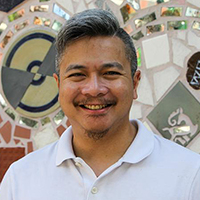by Hendy Matahelemual
Every person from Indonesia is familiar with the 16th century novel from the Ming Dynasty in China, Journey to the West, which features four main characters: Monk Tong, Sun Go Kong, Tie Pat Kai, and Sam Cheng. (Translated into English by Arthur Waley in 1942 as Monkey: A Folk-Tale of China).
The novel tells the journey of the four characters on a mission to retrieve the holy scriptures in the West, enduring 14 cold summers and facing 81 disturbances from demons and monsters before reaching their destination and bringing the scriptures back to China.
Many do not know that this story was inspired by the real journey of a Chinese monk named Xuanzang who, from 629-645 AD, went to India and successfully returned to China bringing back 657 texts of holy scriptures. Although he managed to translate only 75 of the 657 texts into Mandarin, what he did translate was very significant.
From the vantage point of this story, I want to reflect on my journey to the West, in a different context. As one of the staff serving the Indonesian Mosaic churches in southern California, traveling from Philadelphia to Los Angeles is something I often do. Each journey holds different meanings and impressions.
Southern California, especially Los Angeles, is where most of the Indonesian diaspora in the U.S. reside, perhaps because the weather is like that in Indonesia.
There are three Indonesian Mosaic congregations in greater Los Angeles: Imanuel International Fellowship (Colton, CA) JKI Anugerah (Pasadena, CA) and International Worship Church in (San Gabriel, CA) and a ministry partner, Ark of Christ (Anaheim, CA) who is considering membership with Mosaic.
The desert climate of southern California appeals to me. Apart from palm trees, deserts, and mountains, visiting Mosaic communities in California also makes every journey for work feel like visiting one’s own family.
In addition to building relationships, every visit brings a new understanding of ministry that enriches our collective understanding. There is much to learn together because mutual transformation is one of the goals of living in community.
As a conference with a long history of Swiss-German cultural background, and a process of assimilation into Western European-American culture, the new presence of Hispanic, African, and Eastern cultures, each with their own etiquette, can pose challenges.
However, our shared commitment of faith in Jesus, life in the community, and efforts for peace make our journey more beautiful.
I am reminded of the quote, “If you want to walk fast, walk alone, but if you want to walk far, walk together.” And also of the story of two of Jesus’ disciples on their way to Emmaus. As they covered seven miles walking from Jerusalem to Emmaus, Jesus approached them and walked with them.
They did not realize that Jesus was with them until the moment they ate together, and Jesus took the bread, blessed it, then broke it and gave it to them. (Luke 24:13-35)
This verse reminds me of two things. First, that sometimes we are too focused on our goals that we forget to enjoy the journey and miss the presence of God in every process of our lives.
Second, how eating together is an important part of building relationships. Even when we eat together, divine revelation can occur. This happened to the two disciples of Jesus.
Going from one place to another in Los Angeles takes a long time. However, in my journey, I was introduced to a hymn from South Africa, “Hamba nathi” which means “Let’s walk together with Me”.
At this opportunity, allow me to share the song:
Come, walk with us, the journey is long.
Share our burden, and join in the song.
Come, uplift us, and bring us new life.
Give us peace when the journey is done.
The journey, the journey, the journey is long.
In our spiritual journey, let us walk together with our brothers and sisters in faith and enjoy every process with the Lord. Because He never once leaves us or forsakes us. May the Lord bless us.

Hendy Matahelemual
Hendy Matahelemual is the Associate Minister for Community Engagement for Mosaic Conference. Hendy Matahelemual was born and grew up in the city of Bandung, Indonesia. Hendy lives in Philadelphia with his wife Marina and their three boys, Judah, Levi and Asher.
The opinions expressed in articles posted on Mosaic’s website are those of the author and may not reflect the official policy of Mosaic Conference. Mosaic is a large conference, crossing ethnicities, geographies, generations, theologies, and politics. Each person can only speak for themselves; no one can represent “the conference.” May God give us the grace to hear what the Spirit is speaking to us through people with whom we disagree and the humility and courage to love one another even when those disagreements can’t be bridged.
This post is also available in: Indonesia (Indonesian)
This post is also available in: Indonesia (Indonesian)
